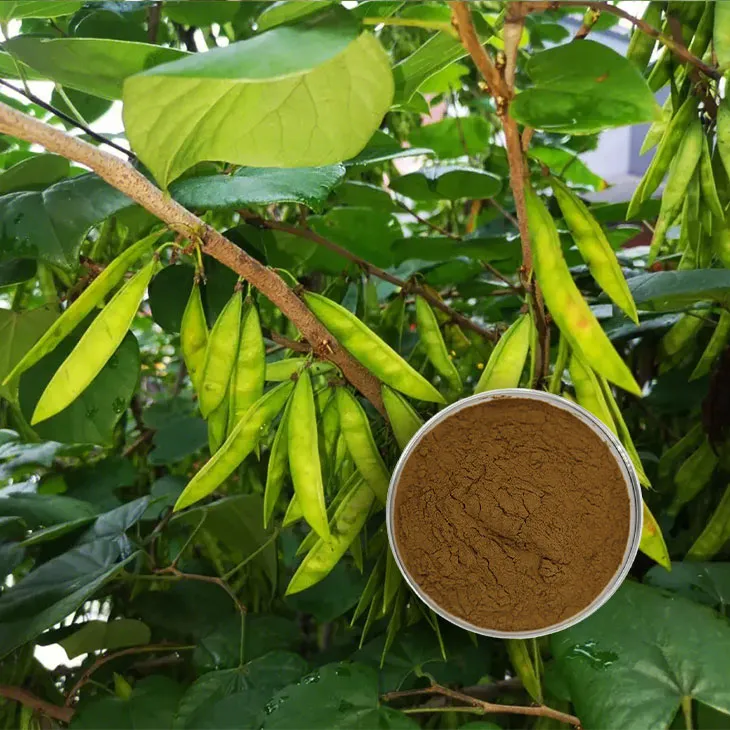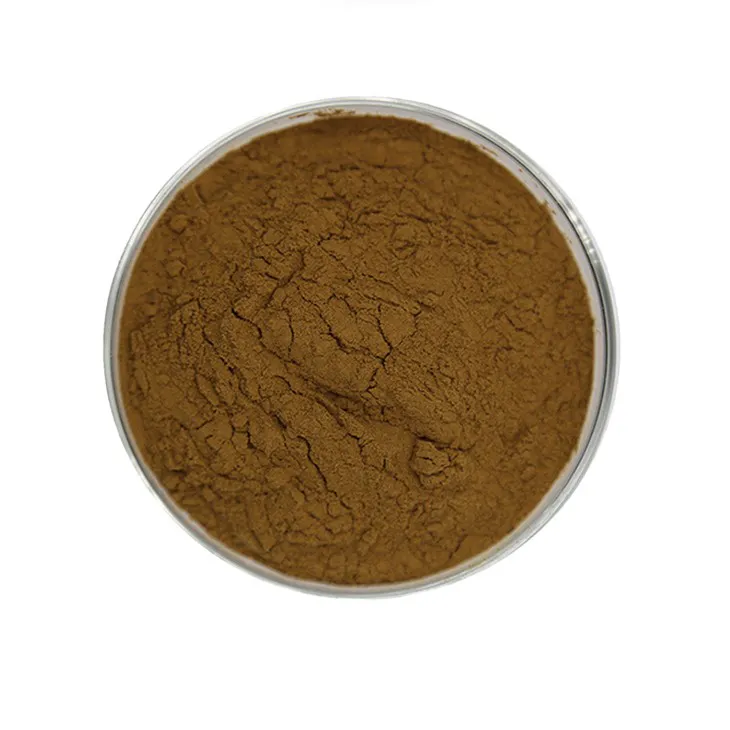- 0086-571-85302990
- sales@greenskybio.com
Are saponin extracts beneficial for diabetes? Are they all safe and applicable for diabetic patients?
2024-11-13

1. Introduction
Diabetes has become a global health concern, and the search for effective natural remedies has been on the rise. Saponin Extracts have emerged as potential candidates in the management of diabetes. However, it is crucial to comprehensively evaluate their benefits and safety for diabetic patients. This article aims to explore these aspects in detail.

2. Saponin Extracts: An Overview
Saponins are a diverse group of natural compounds found in many plants. They are characterized by their soap - like properties when in aqueous solutions. Saponin Extracts can be obtained from various plant sources such as ginseng, fenugreek, and soybeans.
These extracts contain a complex mixture of saponins with different chemical structures. The chemical diversity of saponins may contribute to their diverse biological activities, which could potentially impact diabetes management.

3. Effects on Blood Sugar Regulation
3.1. Insulin - like Activity
Some saponin extracts have been shown to exhibit insulin - like activity. For example, certain saponins from ginseng may mimic the action of insulin in promoting glucose uptake by cells. This could potentially help in lowering blood sugar levels in diabetic patients.
In vitro studies have demonstrated that these saponins can interact with insulin receptors or insulin - sensitive pathways in cells. However, the translation of these in vitro findings to in vivo efficacy in diabetic patients still requires further investigation.
3.2. Inhibition of Carbohydrate - Digestive Enzymes
Another mechanism by which saponin extracts may influence blood sugar regulation is through the inhibition of carbohydrate - digestive enzymes such as alpha - amylase and alpha - glucosidase.
By inhibiting these enzymes, the breakdown and absorption of carbohydrates in the digestive tract can be slowed down. This results in a reduced post - prandial (after - meal) blood sugar spike. Fenugreek saponin extracts, for instance, have been shown to have this enzyme - inhibitory effect.
3.3. Improving Insulin Sensitivity
Some saponin - containing plants may also improve insulin sensitivity. Insulin resistance is a common problem in type 2 diabetes, where cells do not respond effectively to insulin.
Saponin extracts could potentially modulate intracellular signaling pathways involved in insulin sensitivity. This may enhance the body's response to endogenous insulin, leading to better blood sugar control.

4. Potential Side Effects
4.1. Gastrointestinal Disturbances
One of the most common side effects associated with saponin extracts is gastrointestinal disturbances. High doses of saponin - rich extracts can cause nausea, vomiting, diarrhea, and abdominal pain.
This is mainly because saponins can interact with the cell membranes in the gastrointestinal tract, potentially disrupting normal digestive processes. For diabetic patients, these side effects can be particularly concerning as they may affect nutrient absorption and overall health.
4.2. Allergic Reactions
Some individuals may be allergic to saponin extracts. Allergic reactions can range from mild skin rashes to more severe anaphylactic shock in rare cases.
It is important to note that the allergenic potential may vary depending on the source of the saponin extract. For example, someone may be allergic to ginseng saponins but not to fenugreek saponins.
4.3. Interaction with Medications
Saponin extracts may interact with certain medications commonly used in diabetes management. For example, they could potentially enhance the hypoglycemic effect of antidiabetic drugs, leading to an increased risk of hypoglycemia (low blood sugar).
Diabetic patients who are taking medications such as sulfonylureas or metformin should be cautious when using saponin extracts. It is advisable to consult a healthcare provider before starting any saponin - based supplement.

5. Different Types of Saponin Extracts
5.1. Ginseng Saponin Extracts
Ginseng has been used in traditional medicine for centuries. Ginseng saponin extracts, also known as ginsenosides, have been studied extensively for their potential benefits in diabetes.
In addition to their insulin - like activity and potential for improving insulin sensitivity, ginseng saponin extracts may also have antioxidant and anti - inflammatory properties. These additional properties could potentially contribute to overall health in diabetic patients by reducing oxidative stress and inflammation, which are often associated with diabetes complications.
5.2. Fenugreek Saponin Extracts
Fenugreek is a common herb used in cooking and traditional medicine. Fenugreek saponin extracts have been shown to have significant effects on blood sugar regulation, mainly through the inhibition of carbohydrate - digestive enzymes.
Moreover, fenugreek saponin extracts may also have a positive impact on lipid metabolism in diabetic patients. They could potentially help in reducing triglyceride and cholesterol levels, which are often elevated in diabetes.
5.3. Soybean Saponin Extracts
Soybean is a major source of dietary protein. Soybean saponin extracts have been investigated for their potential role in diabetes management.
Some studies suggest that soybean saponin extracts may have a mild effect on blood sugar regulation. They may also have other health - promoting properties such as antioxidant and anti - cancer activities, although their direct impact on diabetes remains to be further explored.
6. Safety Considerations for Diabetic Patients
Diabetic patients should exercise caution when considering the use of saponin extracts. Firstly, it is essential to consult a healthcare provider before starting any saponin - based supplement.
Secondly, the dosage of saponin extracts should be carefully monitored. Starting with a low dose and gradually increasing it while observing for any side effects is a prudent approach.
Thirdly, quality control of the saponin extracts is crucial. Ensure that the products are obtained from reliable sources and are free from contaminants.
7. Conclusion
Saponin extracts show potential benefits in diabetes management through various mechanisms such as blood sugar regulation, insulin - like activity, and enzyme inhibition. However, they are not without potential side effects and safety concerns.
Different types of saponin extracts have their own characteristics and potential impacts on diabetes. Diabetic patients need to be fully informed about the benefits and risks before deciding whether to use saponin extracts as part of their diabetes management strategy.
FAQ:
1. What are the main ways saponin extracts may regulate blood sugar?
Saponin extracts may regulate blood sugar through several mechanisms. Some saponin extracts can enhance insulin sensitivity, which means cells can respond better to insulin and take up glucose more efficiently. They may also inhibit certain enzymes involved in carbohydrate digestion, such as alpha - amylase and alpha - glucosidase. This slows down the breakdown of complex carbohydrates into simple sugars, thereby reducing the post - meal blood sugar spike.
2. Are there any side effects of saponin extracts for diabetic patients?
Yes, there can be side effects. In some cases, saponin extracts may cause gastrointestinal discomfort like nausea, vomiting, or diarrhea. There is also a potential for allergic reactions in some individuals. Moreover, if taken in excessive amounts, they may interact with medications diabetic patients are taking, affecting the efficacy or safety of those drugs.
3. Can all types of saponin extracts be used for diabetes treatment?
No, not all types of saponin extracts are suitable for diabetes treatment. Different saponin extracts have different chemical compositions and biological activities. For example, some saponin extracts from certain plants may have hypoglycemic effects, while others may not have any significant impact on blood sugar or may even be harmful. It is crucial to identify the specific type of saponin extract and its properties before considering its use for diabetes.
4. How should diabetic patients use saponin extracts?
Diabetic patients should first consult their healthcare providers before using saponin extracts. If approved, they should follow the recommended dosage precisely. It is also important to monitor blood sugar levels regularly while using saponin extracts to ensure they are having the desired effect without causing hypoglycemia or other adverse effects. Additionally, they should be aware of any potential interactions with other medications or supplements they are taking.
5. What are the sources of saponin extracts that are studied for diabetes?
There are several sources of saponin extracts studied for diabetes. Some common ones include plants like ginseng, fenugreek, and soybeans. Ginseng saponins have been investigated for their potential to improve glucose metabolism. Fenugreek saponins may help in reducing blood sugar levels. Soybean saponins also show some properties related to blood sugar regulation.
Related literature
- The Role of Saponin Extracts in Diabetes Management"
- "Safety and Efficacy of Saponin - based Therapies for Diabetic Patients"
- "Differential Effects of Various Saponin Extracts on Blood Glucose Levels in Diabetes"
- ▶ Hesperidin
- ▶ citrus bioflavonoids
- ▶ plant extract
- ▶ lycopene
- ▶ Diosmin
- ▶ Grape seed extract
- ▶ Sea buckthorn Juice Powder
- ▶ Beetroot powder
- ▶ Hops Extract
- ▶ Artichoke Extract
- ▶ Reishi mushroom extract
- ▶ Astaxanthin
- ▶ Green Tea Extract
- ▶ Curcumin Extract
- ▶ Horse Chestnut Extract
- ▶ Other Problems
- ▶ Boswellia Serrata Extract
- ▶ Resveratrol Extract
- ▶ Marigold Extract
- ▶ Grape Leaf Extract
- ▶ blog3
- ▶ blog4
- ▶ blog5
-
Organic Tongkat Ali extract powder factory.
2024-11-13
-
How to make powder with ashwagandha extract.
2024-11-13
-
Rosehip extract manufacturers from China.
2024-11-13
-
The best cat's claw extract in nature.
2024-11-13
-
Chinese Dandelion Leaf Extract Suppliers.
2024-11-13
-
Grapefruit Seed Extract Powder
2024-11-13
-
Troxerutin
2024-11-13
-
Acai Berry Extract
2024-11-13
-
Tongkat Ali Extract
2024-11-13
-
Hawthorn Extract
2024-11-13
-
Honeysuckle Pollen
2024-11-13
-
Kidney Bean Extract
2024-11-13
-
Nettle leaf extract
2024-11-13
-
Shikonin
2024-11-13
-
Buckthorn bark extract
2024-11-13





















